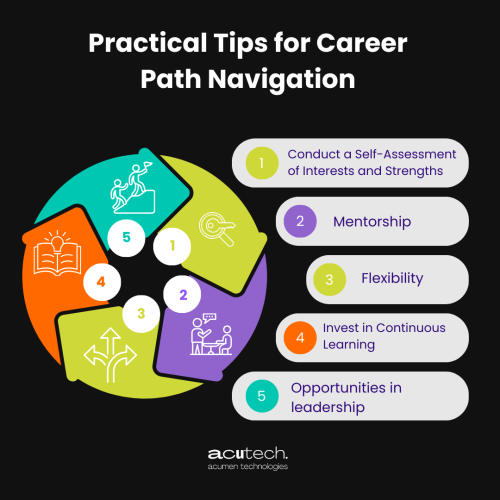Charting a career path for the engineer sometimes feels akin to putting together a very complex puzzle with multiple solutions against an ever-changing backdrop of the world of engineering. This journey not only involves engineering career development but also mastering engineering leadership skills, exploring career opportunities in engineering, and strategizing for engineering career advancement.
At AcuTech, we recognize these challenges and opportunities that lie ahead for engineers, wherever they may be along the path of their careers.
Down below, you’ll find a peek at different roads you can choose from, offering a balanced view on the technical vs management career path, to make an informed decision regarding your professional journey.
A Fork in the Road: Choosing Your Path
The first step in navigating your engineering career is understanding the main paths available: individual contributor, management, and architect. Each path offers distinct roles, responsibilities, and rewards, requiring a unique set of skills and aptitudes. Whether you’re inclined towards deep technical challenges or inspired by leading teams and strategic planning, there’s a trajectory within engineering that aligns with your aspirations and strengths.
Individual Contributor (IC)
The Individual Contributor path is ideal for those with a deep passion for technology and a penchant for tackling complex technical challenges head-on. As an IC, you will immerse yourself in coding, system design, and problem-solving, continuously expanding your technical skill set. This role is about becoming a linchpin in your area of expertise, whether it’s front-end development, back-end systems, data science, or any other specialized field within software engineering.
You will have the opportunity to innovate, influence product development through your technical contributions, and become a go-to expert. This path is suited for those who thrive in environments where they can delve deeply into technical work without the direct responsibilities of team management.
Management
The management track is tailored for those who aspire to lead and inspire teams, strategize project execution, and drive technical initiatives from conception to completion. In this role, your ability to communicate effectively, organize project workflows, and motivate your team members is just as critical as your technical understanding.
As a manager, you will oversee the development process, manage resources, and ensure that projects align with organizational goals. This career path is for individuals who are passionate about mentoring others, making strategic decisions, and navigating the challenges of delivering complex software projects on time and within budget.
Architect
The Architect role is a pivotal one, serving as a bridge between hands-on technical work and strategic project oversight. Architects are responsible for designing the fundamental structures of software systems, ensuring scalability, security, and efficiency. They tackle high-level technical problems, making decisions that affect the project’s architectural direction and ultimately, its success.
This role requires a deep understanding of both technical and business considerations, as architects must design systems that not only meet current requirements but are also adaptable to future changes and growth. Ideal for those who enjoy conceptualizing big-picture solutions and working closely with both ICs and management teams, the architect path combines deep technical expertise with strategic thinking.
The Importance of Leadership Skills
In software engineering, possessing the technical ability to craft efficient code or design scalable systems represents just one aspect of the broader picture. Equally imperative is the development of leadership skills, essential for engineers to truly excel in their careers. Leadership within software engineering surpasses the conventional tasks of managing teams or projects; it’s about inspiring and motivating colleagues, creating a fertile ground for innovation and cooperative efforts.
Effective communication lies at the core of these leadership capabilities. It enables engineers to clearly convey visions, synchronize team endeavors, and adeptly handle the intricacies of project demands. This competency ensures that every team member, irrespective of their technical knowledge, understands the objectives, leading to more streamlined project execution and the fostering of innovation.
Strategic decision-making further empowers engineers to steer projects through challenging times, harmonizing technical hurdles with business goals. This involves evaluating risks, predicting industry shifts, and opting for strategies that promise long-term prosperity and resilience.
Thus, leadership skills are indispensable at every tier of engineering. They not only bolster the career trajectory of individuals by readying engineers for more significant roles but also amplify the collective achievements of their teams and organizations. Cultivating these skills is an ongoing endeavor, vital for personal development and the progression of software engineering as a field.
Practical Tips for Career Path Navigation
Navigating a career in software engineering requires more than just technical skills. Here are practical tips to guide your journey and optimize your career path:
- Conduct a Self-Assessment of Interests and Strengths: Reflect on what really interests you, and also where your strengths lie. Your career path should jibe with your interests and abilities, for long-term satisfaction and success.
- Mentorship: Seek for mentors who have the potential to guide, share experiences, and give insights towards subtleties in each direction. His advice can really make the difference in helping you make an informed decision.
- Invest in Continuous Learning: Since engineering is a very dynamic field, keeping up to date with the latest technologies, methodologies, and best practices is extremely crucial. Look at certifications, workshops, and further education as opportunities to further develop and increase your value.
- Opportunities in leadership: Look for leadership opportunities—taking the lead on a project, volunteering for cross-functional teams, or mentoring junior colleagues—each experience in some way adds value toward gaining the skill sets critical for advancement.
- Flexibility: Interests and objectives may change as years pass by, and so does the career path one takes. Keep room for the reassessment of career decisions since, like any other career path, changing plans is an inevitable step in changing career routes whenever necessary. Flexibility is the key that will ease your way through a rollercoaster career in engineering.

Conclusion
Picking engineering as a career path would be one of those decisions where the impact could be too large on your future career. Whether that leans toward deep technical acumen, the challenges of leadership, or strategic thinking of an architect, the key is to play toward your strengths and passions. At AcuTech, we invest in our engineers by providing the support, opportunities, and resources necessary to find their place in the industry and to flourish as professionals.
Because remember, after all, it’s not only about the destination, but also the journey. So, smile at every challenge, celebrate even the smallest achievement, and try to push the maximum possibilities at your workplace. If you are ready to take the next leap in your engineering career, reach out to us. And, let’s build the future together.
Ready to contribute towards crafting the future of engineering? Join AcuTech today and become part of the team where personal growth and success represent our core values. Get in touch to discuss opportunities and start the journey with us.


